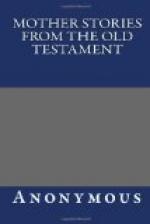In Scripture frequent mention is made of the husbandman and his work. Ploughing the land, sowing the seed, reaping the harvest, and winnowing the grain are often referred to. Our picture shows an Eastern husbandman ploughing. How different it is to ploughing in our own land! There is no coulter; and instead of the broad steel plough-share we see a pointed piece of wood. And the long handles with which our labourers guide their ploughs—where are they? The strong horses, too, harnessed one behind the other, are missing. Yes! none of these were used in Canaan. Small oxen drew the plough; and the husbandman guided it by means of a single handle, as we see him doing in the picture. Thus their method of ploughing was a slow one, and unless the land had been very good their harvests would have been poor.
Often these husbandmen had to wait until the rain made the ground soft enough for their ploughs to enter it, consequently many had to toil in cold, stormy, winter weather. To this the proverb alludes which says: “The sluggard will not plough by reason of the cold; therefore shall he beg in harvest, and have nothing.” (Prov. xx. 4.)
Perhaps it was just such a plough, drawn by just such oxen as we see in our picture, that Elisha was using when Elijah passed by and cast his mantle upon him; thereby calling Elisha to be his servant and successor. We are told that Elisha “took a yoke of oxen, and slew them, and boiled their flesh with the instruments of the oxen, and gave unto the people, and they did eat. Then he arose, and went after Elijah, and ministered unto him.”
[Illustration: Ploughing in Canaan.]
THE SHUNAMMITE’S SON.
Many interesting stories are told in the Bible, few of which are more touching than that of Elisha the prophet, and the Shunammite woman. This story we find in the fourth chapter of the Second Book of Kings.
We read of the prophet journeying to and fro, and resting in the little chamber that the kind Shunammite had built for him on the wall of her house. We see its bed, table, stool, and candlestick; and the joy beaming upon the good woman’s face when a tiny infant son was given her. How she loved him! And as he grew up how carefully she watched over him. But a sad time was coming.
The golden corn was in the field ready for reaping, for the harvest time had come. The hot sun shone overhead, and the little lad was out with his father in the field, probably running about among the corn. Suddenly he felt a violent pain, and cried out, “My head, my head!” Then joy was changed to sorrow. The father saw his son was ill, and bade a lad carry the little boy to his mother, on whose knees he sat till noon, and then he died.
Next we see the mother leaving her dead son, and journeying to find the prophet. Elisha sees her coming, and sends Gehazi to inquire if all is well. Then she falls down before the prophet and tells him her trouble; and he sends his servant with his staff to lay it upon the dead child. The story closes by stating how Elisha follows Gehazi, goes to the chamber where the dead boy lay, prays to God that the life may be restored, and finally has the joy of giving the lad, alive and well again, into the arms of his mother.




